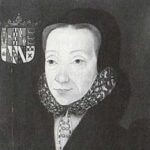
Sir Edward Unton
Date of Birth
3 May 1535
Place of Birth
Faringdon, Berkshire, England, United Kingdom
Towns / Cities Moved Into
Hatford, Berkshire, England | Faversham, Kent, England, United Kingdom
Known Occupation
High Sheriff and Knight of the Bath
Religion
-
Spouse
Death Information
Year of death
16 September 1582
Place of death
Faversham, Kent, England, United Kingdom
Cause of death
-
Obituary

Parents

Alexander Unton

Cicely Bustrode
Marital Status


Married Lady Anne Seymour
29 April 1555
Hatford, Berkshire, England.
Siblings



Children







Narrative / Story
In the lush landscapes of Faringdon, Berkshire, England, a story of nobility, duty, and influence began with the birth of Sir Edward Unton on May 3, 1535. The eldest son of Sir Alexander Unton and Cecily Bustrode, Edward’s early life was shaped within the nurturing walls of Wadley House, surrounded by his siblings Henry, Elizabeth, and Thomas. His journey from a noble heir to a respected figure in Tudor England was marked by a blend of personal milestones and public service.
Knighted in 1559, Edward’s career was a testament to his dedication to the realm. He served as the High Sheriff of Berkshire in 1567 and represented his county as a Member of Parliament in 1572, with prior terms in Malmesbury and Oxfordshire. His roles were not mere titles but responsibilities he carried with the gravity and diligence expected of a man in his position.
Edward’s personal life was equally significant. His marriage to Lady Anne Seymour, daughter of Edward Seymour, 1st Duke of Somerset, on April 29, 1555, in Hatford, Berkshire, was not just a union of hearts but also of influential families. Their life together brought joy and sorrow, with the birth of their seven children – Mary, Anne, Edward II, Francis, Henry, Cecilia, and Ralph – and the early loss of three sons. Edward’s legacy continued through his surviving children, with Edward II becoming an MP for Berkshire and Henry serving as the English ambassador to France.
Living in 16th-century England, Sir Edward Unton’s life was intertwined with the socio-economic and political dynamics of the Tudor period. His noble status placed him above many of the era’s hardships, yet he was deeply involved in the issues of his time, including religious upheaval and social stratification. His public duties and private life were a constant navigation through these challenges.
Sir Edward Unton’s journey came to an end on September 16, 1582, in Faversham, Kent. His final resting place in Faringdon, Berkshire, marks not just the end of a life but the enduring legacy of a man who lived through one of the most dynamic periods in English history. His story, a tapestry of duty, family, and service, offers a glimpse into the world of Tudor England, reflecting the complexities and responsibilities of nobility.